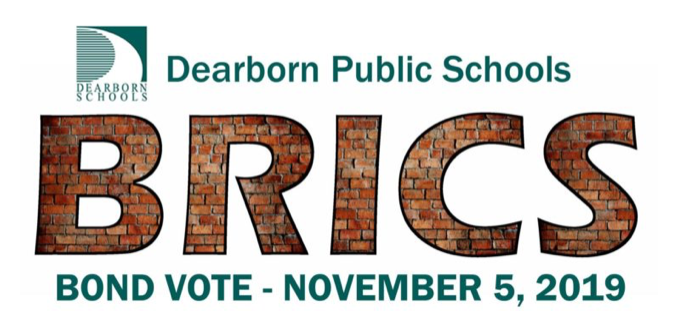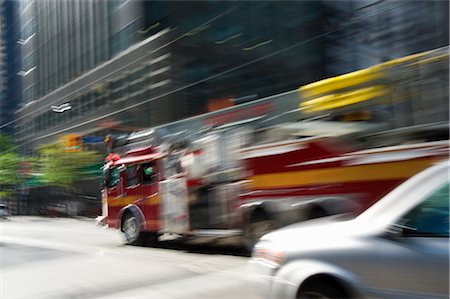Dearborn Citizens Reject BRICS Bond: What are the Consequences?
On Nov. 5, 2019, after a long and heated campaign, the BRICS bond, which would have allocated $240 million for infrastructure for Dearborn Public Schools, failed by a margin of 470 votes. This vote split Dearborn, many saying it would be a wonderful idea that would promise a better future for Dearborn schools and help their crumbling infrastructure, whilst many also said that it would be a waste of money and would not fix any of the problems that the district is currently facing. It is important to understand how people from both sides feel, but also, most importantly, what administrators plan to do in order to move forward and address current problems the district is facing.
Director of Communications for Dearborn Public Schools, David Mustonen, said he was disappointed by the results of the vote, and that many problems the district wanted to solve with the BRICS bond will be delayed.
“The District was disappointed that the bond proposal was defeated by about 500 votes. The outcome was unfortunate because now all the work that needs to be done will be delayed for at least two years. So just one of many examples include Haigh Elementary. There were plans to add 4 classrooms and cafeteria space to address capacity issues. The funds for that project are not available so that work will be delayed,” Mustonen said.
Overpopulation is a huge issue for many in the Dearborn Public Schools district, and combating overpopulation via creating more classrooms was one of the goals of BRICS. The proposed bond aimed to allocate $21 million for increasing capacity in schools. An example of the overpopulation issue is in DHS and Fordson High School. The ideal capacity of DHS is 1800 students, but it currently has around 2100 students. It is even worse for Fordson. Their ideal capacity is 2300 students yet they currently have 2800 students enrolled. The average classroom size of these schools, according to a 2018 Arab American News report, is 30, which is well above the national and state average. However, it is important to note that BRICS would not have allocated any funds for capacity to the high schools in Dearborn. It only allocated capacity funds to 11 schools, 8 of them being elementary schools. But now that the BRICS bond had been rejected, no schools will be able to receive funding at all, and the overcrowding problem is expected to get worse, especially for eastern Dearborn, which has an ever growing and concentrated population.
Despite the defeat, the district is still committed to finding some way to raise more money for some of the schools which are in need of repair. Mustonen said that the school district will try getting another initiative on the ballot for next year and this time they will work on trying to correct some lies that were spread about the BRICS, as well as being more interactive with the citizens of Dearborn.
‘’The Board of Education will provide the administration with direction on next steps. Most likely, but not yet decided, a new proposal will be placed on the November 2020 ballot. Before any new proposal can be placed on the ballot, conversations will need to take place with all stakeholders to help in developing a new plan that includes ideas and suggestions from those who are just now coming to the table and are now interested in the Dearborn Public Schools.’’ Mustonen said. ‘’During the weeks before the election there were inaccurate statements made by those opposing the bond and it will take time to correct those statements and rebuild trust within the community.’’
However, even if the school district gets another initiative on the ballot, there are some chances that it would fail. According to the Dearborn Public Schools website, interest rates are climbing and they fear that if they delay then the costs to pay for a bond would increase. Along with that, the school website reports that according to Engineering News, construction costs are increasing 5% every year. Another concern for the DPS as they wish for a ballot to be voted upon in later years is the millage. The millage, which is a local property tax, is set to expire before the next referendum, meaning that instead of getting money from a predefined millage with no tax increases, if the board wants another bond, then they will have to do it with a tax increase. Given that the bond failed when taxes were not even going to increase, it is likely that since taxes are likely going to increase the next time, that this vote will fail again, at an even greater margin.
Some other reasons for why one would have voted no for the BRICS bond was that they thought their taxes would increase. For example, Dearborn resident Hamoudi Al-Said, said he voted “No” on BRICS because he thought it would increase his taxes.
“ I support our schools, but $250 million is just far too much. Where is that money coming from? It’s coming from our pockets. I already pay too much in taxes, the school district need to find another way to get it.” Al-Said said. It is important to know that the bond would not have increased taxes on Dearborn residents. Instead, it would have allocated more money from the millage rate in order to pay for the bond, and it would not have increased the millage rate. However, Zahra Ahmad, another Dearborn resident who voted “No” on the BRICS bond, said she felt suspicious of the school board. “They say they’re not going to raise taxes, but I just don’t believe them. When it comes to government, you can’t really trust them. They’re always lying to you.” Ahmad said.
Personally, I supported the BRICS vote. I do believe that our schools need improved infrastructure. I also believe that fake news and misinformation was a major reason why this vote failed. Thousands of citizens said they distrusted the government and they told each other their taxes would increase, despite the fact that they would have kept the millage rate the same. Many “No” voters were misinformed. They fell for lies spread amongst each other in a similar way that people were falling for lies in the 2016 election cycle. In this age of unregulated social media where people seek confirmation bias and get their news from others on social media that they agree with, lies are easy to spread, and they come with consequences. Because of fake news, our schools will have less funding to fix their crumbling infrastructure, and sadly, with less funds to fix the schools, that money will have to come from somewhere else.
Mrs. Kubicek, a teacher at DHS who was involved in the BRICS campaign, said that since the BRICS bond failed, the school district will have to look elsewhere to get their funds, which could lead to a reduction in teacher salaries.
“The school has a general fund, it is given to us from the state. This fund pays for things like teacher salaries. Dearborn currently has an issue with their bathrooms, with the BRICS bond they were planning on fixing it. Other schools need to repair roofs, swimming pools, they need to fix that immediately. Now that the BRICS bond has failed, the district still needs to address those issues, and since now we won’t have the bond, they will have to take money directly from the general fund, which will affect teacher pay, school supplies, etcetera.” Kubicek said.
I do understand what many people on the No campaign want. It would be nice if the district focused more on improving our academics and expanding opportunities to students. Just as the Yes campaign has many complaints about the poor infrastructure in our schools, DHS is also falling behind academics wise, many of the text books we have in this school are old, torn and outdated. Many classes lack textbooks, some classes don’t have textbooks at all. I also feel bad that compared to other schools, DHS doesn’t offer as many opportunities, for example we lack many AP classes, which disadvantages those who wish to earn college credits in high school. For example, schools like Brighton High School, offer far more AP classes than Dearborn, including AP World History, AP European History, AP Calc BC, to name a few, and Novi High School offers several classes like AP Spanish, AP French, and AP Physics C. And along with that, teacher salaries are still far too low given the work that they do every day. But it is important to know that this is a bond, bonds cannot be used for salaries or text books, and because the voters have blocked so much money from going into to Dearborn Public Schools, then it could actually lead to the schools being shorter on money and having to divert money from their general fund towards infrastructure, taking away from what would have gone to things like new supplies and teacher salaries, therefore, many people who voted No actually are accomplishing the opposite of what they wished for. I hope that the school district will submit a new bond and that they will do a better job of educating the general populous. The school board needs to combat fake news if they will submit a new bond for next year, or else it could harm Dearborn Public Schools, and the future generation of Dearborn students. I also believe that us students need to educate many adults who fall for fake news on a daily basis, telling them the truth, telling them to look for more credible sources, and if they, or even if you did not support the BRICS vote, then make sure it is for actual reasons and not because of fake news.





